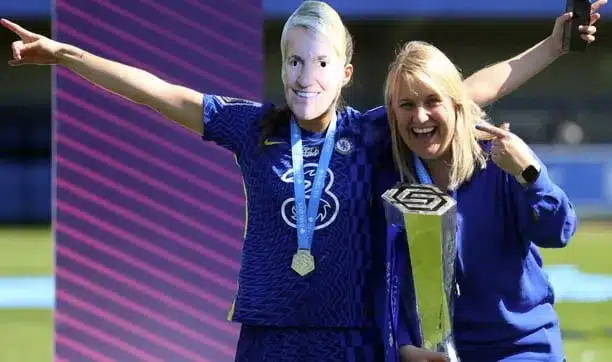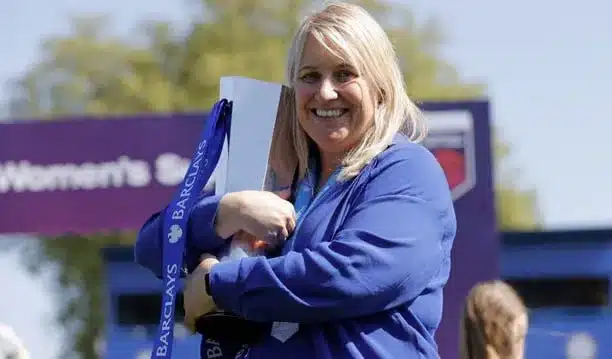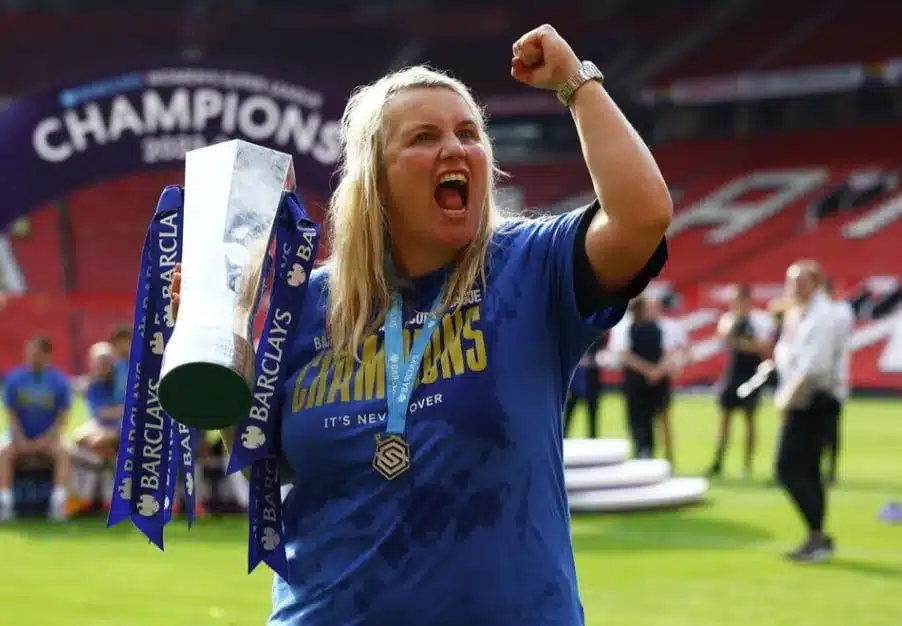Chelsea manager Emma Hayes will be supporting her team from home during her recovery, a testament to her dedication to the club.
The world of women’s football has rallied around Chelsea FC Women’s manager Emma Hayes after her recent emergency surgery. In a heartfelt statement, Hayes revealed she underwent an emergency hysterectomy last Tuesday as part of her ongoing battle with endometriosis. While this means the iconic manager will be temporarily stepping back from her day-to-day duties, her influence at Chelsea remains undiminished.
Assistant manager Paul Green, who will handle media obligations during Hayes’ absence, emphasized that health priorities transcend football. “Of course, Emma’s health is the most important thing beyond football,” Green stated during Friday’s press conference, showcasing the supportive environment at the club.
Navigating Chelsea’s Leadership Transition
With Hayes recovering at home, Chelsea’s well-established backroom staff has seamlessly assumed greater responsibilities. Assistant manager Denise Reddy will make on-field decisions alongside Green, creating a collaborative leadership structure built on experience and mutual respect.
Assistant coaches Denise Reddy and Paul Green bring extensive experience to Chelsea’s interim leadership structure during Hayes’ recovery period.
This isn’t unfamiliar territory for Chelsea, as Green pointed out: “We were in this situation back in 2018 when Emma was pregnant, so it’s not a new situation.” The coaching staff’s continuity provides stability during this transitional period, with Green expressing “full confidence in the staff and the players that we’ll get the results needed.”
The timing of Hayes’ surgery during the international break provided valuable preparation time. “We were aware of it just before the international break so that gave the opportunity to get set up,” Green explained, highlighting the club’s strategic approach to managing this challenge.

Hayes’ Ongoing Involvement and Influence
Despite her physical absence from the dugout, Hayes remains connected to her team. Green revealed: “Emma will definitely still be involved. With the character she is, she’ll be at home watching all the training online, linked into the bench on the matchdays.” This remote involvement ensures tactical continuity while respecting her recovery needs.
Hayes’ decision to publicly share her health journey has been widely praised as an important moment for women’s health awareness in sports. Green noted: “Emma is very open and honest and a real inspiration for everybody out there. This is just another example of her being very open and getting women’s issues out there for everybody to talk about.”
Medical experts like Dr. Sarah Thompson, a sports medicine specialist, emphasize the importance of such transparency: “When high-profile athletes or coaches speak openly about health issues like endometriosis, it reduces stigma and encourages other women to seek appropriate care. Hayes’ openness could have a positive impact far beyond football.”
Chelsea’s Immediate Challenges and Title Prospects
The Blues face a demanding schedule during Hayes‘ recovery, with crucial matches across multiple competitions. Their next three fixtures include away games in the Women’s Super League against Everton and Brighton, sandwiched around a Champions League trip to PSG.
Speaking about their upcoming match against Everton, Green maintained focus: “We’re all looking forward to it. Denise and I will make sure the team are ready for the game. We’ve got full respect for Everton, we know they’re a very good team under a new manager.”
The team’s leadership structure extends beyond the coaching staff, with captains Magda Eriksson and Millie Bright playing crucial roles in maintaining standards. Green expressed confidence in the squad’s professionalism: “We’ve got Magda and Millie, the two captains, along with other senior players, who I’m sure will be making sure the players maintain their standards.”
The Bigger Picture: Women’s Health in Professional Sports
Hayes‘ situation has sparked important conversations about how women’s health issues are managed in professional sports. Endometriosis affects approximately 1 in 10 women worldwide, yet it remains under-discussed in athletic contexts.
Sports psychologist Dr. Michael Reynolds notes: “The support Chelsea FC is showing Hayes sets an important precedent for how clubs should handle health matters. Prioritizing an individual’s wellbeing over immediate competitive demands creates a healthier sporting culture overall.”
The football community has united in support of Hayes, with messages pouring in from across the sport. Brighton manager Hope Powell joined many others in sending best wishes, stating: “The most important thing is her health and her wellbeing. We all wish her a very speedy recovery.”

Emma Hayes’ Health Comes First: Chelsea’s Interim Leadership Navigates Title Challenge
As Emma Hayes focuses on her recovery, Chelsea’s well-established structure ensures continuity both on and off the pitch. The collaboration between Paul Green, Denise Reddy, and the experienced backroom staff provides stability during this period, while Hayes’ remote involvement maintains her strategic influence.
The situation underscores an evolving approach to health management in professional sports, where player and staff wellbeing receives appropriate priority. Hayes’ openness about her endometriosis journey contributes to broader conversations about women’s health in athletics, potentially helping to destigmatize these discussions across sports.
For Chelsea fans and followers of the WSL, the coming weeks will demonstrate the resilience of Hayes’ system and the adaptability of her squad. As the team navigates this challenging period, their performance could become a testament to the culture and structure Hayes has built over her decade at the club.
What are your thoughts on how sports organizations handle health-related absences of key personnel? Share your experiences and perspectives in the comments below, and don’t forget to follow Baji999 for more in-depth analysis of women’s football developments.

